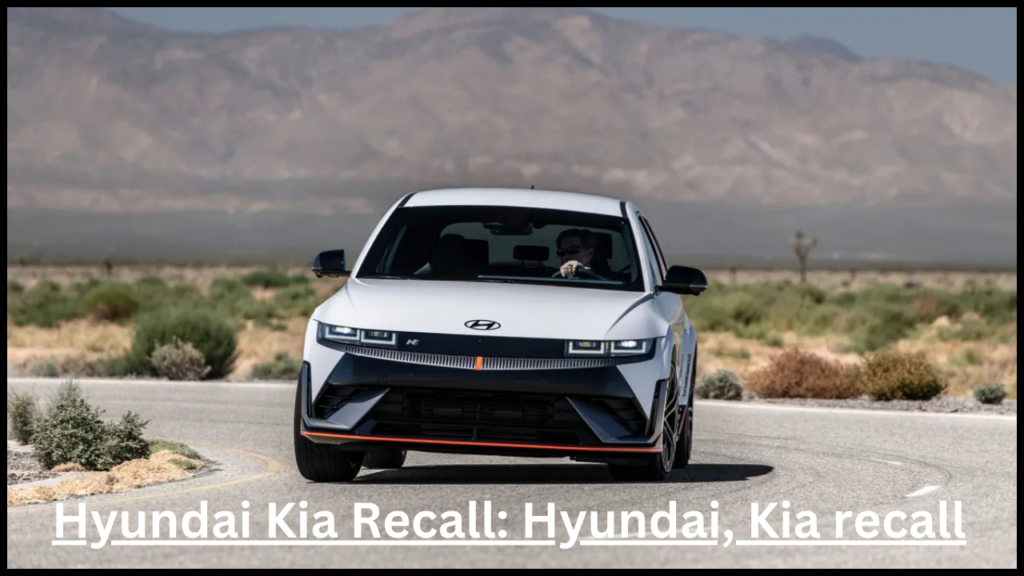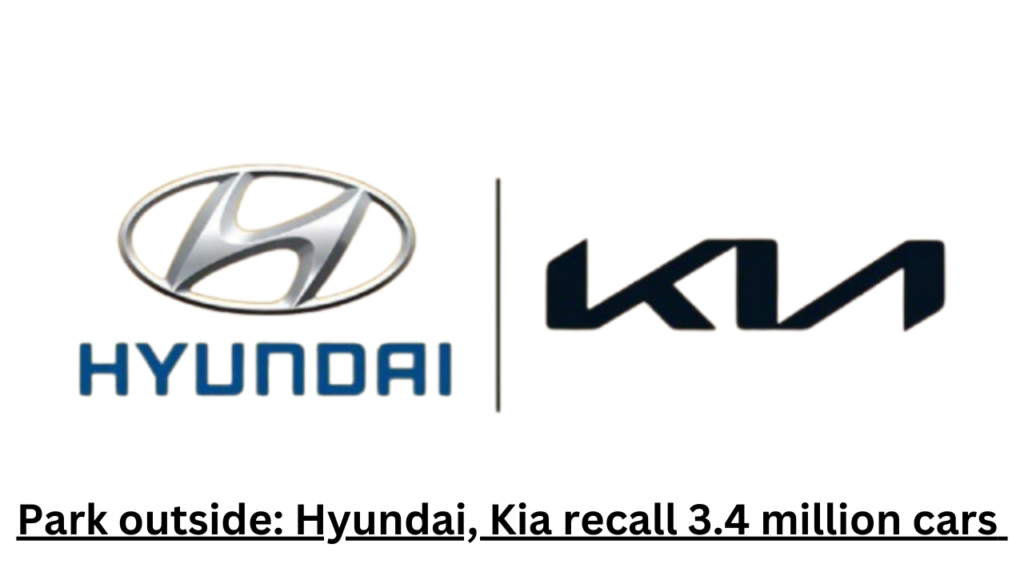Hyundai and Kia Recall Over 208,000 EVs to Remedy a Loss of Driving Power Issue
Introduction
In order to remedy a problem that can result in a loss of driving power and raise the risk of accidents, Hyundai and Kia have issued a recall (Hyundai and Kia Recall) affecting more than 208,000 electric vehicles. This includes over 145,000 Hyundai and Genesis models like the 2022–2024 Ioniq 5, 2023–2025 Ioniq 6, GV60, GV70, and 2023–2024 G80. By addressing this critical issue, the automakers aim to enhance safety and ensure compliance with updated regulations. The specifics of the recall, its justifications, and what to do if you own one of the impacted cars will all be covered in this blog article.

Hyundai is recalling some electric cars due to the possibility of damage to the Integrated Charging Control Unit (ICCU), according to the National Highway Traffic Safety Administration (NHTSA). The 12-volt battery may cease charging as a result of this damage, which could lead to a loss of driving power. According to NHTSA estimates, this problem affects about 145,235 automobiles.
Details of the Recall
According to the NHTSA, the issue stems from a potential defect in the Integrated Charging Control Unit (ICCU), which could lead to a loss of driving power. In order to remedy a problem that can result in a loss of driving power and raise the risk of accidents, dealerships will inspect and replace the ICCU and its fuse, if necessary, at no cost to the owner.
Even vehicles that were previously repaired under an earlier recall might need further servicing to ensure the latest safety measures are implemented. Hyundai and Kia (Hyundai and Kia Recall) are taking these additional steps in order to remedy this problem effectively and maintain customer trust.
The Problem and Solution
According to the NHTSA report, Hyundai dealerships will inspect the ICCU and its fuse, replacing them if necessary, at no cost to the owner. This recall is an extension of a previous one, meaning vehicles that were already repaired may need additional servicing in order to remedy a problem that can result in a loss of driving power and raise the risk of accidents. Hyundai is committed to ensuring the impacted automobiles meet the latest safety standards in order to remedy this problem effectively.
Since the recall specifically aims to remedy a problem that can result in a loss of driving power and raise the risk of accidents, Hyundai is urging all affected owners to bring their vehicles in promptly. This additional maintenance will help ensure the vehicles meet safety regulations and provide peace of mind in order to remedy the concerns raised by the earlier defect. By addressing these issues proactively, Hyundai guarantees the highest standards of safety for its customers.
Why the Recall Is Necessary
The National Highway Traffic Safety Administration (NHTSA) has identified a defect in the Integrated Charging Control Unit (ICCU) of these vehicles. In order to remedy a problem that can result in a loss of driving power and raise the risk of accidents, the affected vehicles will undergo an inspection. The ICCU and its fuse may need to be replaced to ensure the vehicle’s safety and prevent further complications. Even vehicles that were previously serviced during a prior recall may need additional repairs in order to remedy this problem and meet the updated safety standards. Hyundai and Kia are taking these additional steps to ensure that their vehicles remain as safe as possible.
Kia’s Involvement
There are more brands impacted by this problem besides Hyundai. Hyundai and Kia recall vehicles due to the same issue, with Kia, partially owned by Hyundai, also issuing a recall. Approximately 63,000 Kia EV6 cars built between 2022 and 2024 are included in the Hyundai and Kia recall. The NHTSA recall report estimates that the defect is likely to occur in 1% of these vehicles. As part of the broader Hyundai and Kia recall, both manufacturers are addressing this issue to ensure the safety and reliability of their electric vehicles.
The charging control unit is the problem with Kia cars, just like it is with Hyundai ones. Damage to one of the unit’s transistors could stop the 12-volt battery from charging. Drivers may eventually lose all motive power if they disregard warnings about the depleting battery and keep operating the car in reduced power mode.
What Affected Owners Need to Know
Hyundai and Kia will send letters to affected car owners in December 2024 and January 2025. These letters will provide instructions for scheduling a service appointment in order to remedy a problem that can result in a loss of driving power and raise the risk of accidents. The repairs will be done free of charge at authorized dealerships, ensuring that owners do not have to bear the cost of fixing the issue.
Dealer Actions
At no additional expense to the owner, Kia shops will check and replace the control unit and fuse as needed. To further reduce dangers, they will also upgrade the car’s software. For this new repair, owners of cars that were involved in a previous recall this year will also need to go back to their dealers.
Communication with Owners
“Letters informing impacted car owners will be mailed by Hyundai and Kia in December 2024 and January 2025. In these letters, owners will find all the details they need in order to remedy a problem that can result in a loss of driving power and raise the risk of accidents. The letters will also include clear instructions on how to schedule an appointment with their local dealership for the necessary repairs.”
Broader Implications
These kinds of recalls emphasize how crucial safety precautions are in the rapidly changing electric vehicle market. Problems like these will inevitably arise as automakers keep coming up with new ideas and pushing the limits of electric vehicle technology. Proactive measures like recalls, however, guarantee that producers quickly resolve possible hazards, safeguarding customers and their financial investments.

Tips for Vehicle Owners
If you own any of the mentioned Hyundai, Genesis, or Kia models, it’s essential to:
- Pay Attention to Warnings: Pay attention to any dashboard notifications or alerts about power or battery health problems.
- Make an Appointment for servicing Right Away: Get in touch with your dealership to make an appointment for servicing as soon as you receive a recall notice.
- Stay Informed: To find out the latest information on the condition of your car, pay attention to any official statements made by Hyundai, Kia, or the NHTSA.
Conclusion
The recall of more than 208,000 cars by Hyundai and Kia shows how committed they are to fixing safety issues with their array of electric vehicles. Even while these recalls might appear inconvenient, they demonstrate the industry’s commitment to upholding consumer safety and confidence. When notified, car owners should take immediate action to minimize hazards and maintain the best possible condition of their vehicles. Hyundai and Kia’s recall is an important step in remedying a problem that can result in a loss of driving power and raise the risk of accidents. By addressing this issue proactively, they are ensuring the safety and satisfaction of their customers. If you own one of the affected vehicles, it’s important to schedule a service appointment with your dealership promptly to avoid any future risks. (Hyundai and Kia Recall)
Communication with Owners
Hyundai and Kia will send letters to impacted car owners, which should arrive in December 2024 and January 2025. In order to address an issue that may cause a loss of driving power and increase the likelihood of accidents, these letters will outline the next steps, including how to make an appointment with a nearby dealership.
Dealer Actions
Once you bring your vehicle to a dealership, technicians will inspect the ICCU and fuse, replacing them as needed. The dealerships will also update the vehicle’s software in order to remedy a problem and enhance safety. These steps are necessary to prevent any potential loss of driving power that could lead to a dangerous situation on the road.

